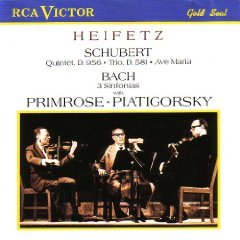| All Artists: Schubert, Heifetz Title: Quintet in C Members Wishing: 1 Total Copies: 0 Label: RCA Release Date: 10/25/1990 Genres: Pop, Classical Styles: Vocal Pop, Chamber Music, Forms & Genres, Symphonies, Historical Periods, Baroque (c.1600-1750), Modern, 20th, & 21st Century Number of Discs: 1 SwapaCD Credits: 1 UPC: 078635796421 |
Search - Schubert, Heifetz :: Quintet in C
 | Schubert, Heifetz Quintet in C Genres: Pop, Classical
|
Larger Image |
CD Details |
CD ReviewsOne of Heifetz' most controversial chamber music recordings Discophage | France | 10/03/2006 (1 out of 5 stars) "Heifetz is ever a controversial violinist and chamber music leader.
This recording of Schubert's C-major Quintet was made in 1961 and part of a series of chamber music recordings with Heifetz as band leader, now documented on RCA's Heifetz collection. I had so hated it on LP that I got rid of it years ago - something I seldom do - , but in my experience, as my knowledge of multiple versions (I am now approaching twenty of this one) and understanding of a piece grows, I become more tolerant and - well, understanding to approaches that do not correspond to my initial expectations, as I realize that there is not one interpretive "truth", but a variety of possible and legitimate approaches to what the composer wrote, each one highlighting the composition. Assessing a given interpretation means, in my opinion and practice of music listening, understanding in which interpretive tradition it fits, how well it realizes it, and, if at variance with established custom, what musical validity that specific approach may have on its own terms. With all its reckless tempos, Heifetz's recording of Brahms' second sextet has become one of my favorites, as I find that it lends extraordinary romantic fire to the piece, with no loss of lyricism (Brahms: Hungarian Dances WoO1; Dvorak: Quintet No2). So I decided to give a new try to this one. I find it as hateful as before. At variance with any established tradition it is, with a vengeance. I read somewhere on the net a comment maintaining that, contrary to the cliché, Heifetz did not play everything faster, but that his clarity of articulation only gave that impression. That commentator should have used a stopwatch! These guys must have had the 5pm train to catch! Compare their timings to those of the Pro Arte Quartet, who made the first recording in 1935 (Biddulph The Pro Arte Quartet play Schubert: Quintet for 2 violins, viola & 2 cellos in C major, D. 956 / Brahms: String Sextet No. 1 in B flat major, Op. 18), themselves by no means a slow reading: 14'/12'20/9'/9'17 to Heifetz's 12'47/10'22/7'37/7'45. The tempos of Felix Galimir and Marlboro partners (Sony Schubert: Quintet in C D. 956; The Shepherd on the Rock) are unusually spacious, and they clock (1st movement repeat deducted to make things comparable) at 16/16:25/9:35/9:50. Among recent versions the Orpheus Quartet (Channel Classics Schubert: String Quintet In C Major D 956) is a fast one and its timings (without 3rd movement repeat) are 14:10/13:40/8:05/9:10. So Heifetz and partners are in a class of their own. Clearly, most of their tempo choices blatantly disregard Schubert's indications - all due consideration given to the fundamental imprecision of such literary markings. In the opening movement they don't seem to have noticed that Schubert added "ma non troppo" to his "Allegro" ; one wonders what Schubert should have written in place of "Adagio" for them to take the 2nd movement just a bit slower - "lentissimo possible"? and their Finale is taken Presto rather than the Allegretto written by Schubert. Yet, independent of the score - does it work musically? Granted, in places it does. The Scherzo's outer sections (and Schubert has indeed written Presto here) have explosive drive, and, by stretching one's tolerance and understanding, one could consider that some 3 minutes in the central part of the adagio exude a gripping, desperate violence. And that's it. I am well aware that how one reacts to these unusual tempos is a matter of taste, but to me the first movement sounds as the sonic equivalent of those old movies shot at 20 images/s and broadcast at TV's 25/s, or as a 33rmp played at 45rmp speed. In the sublime adagio I find both the fast tempo of the Pro Arte Quartet and the slow, time-suspended movement of the Melos Quartet with Rostropovich (DG Schubert: String Quintet In C Major, D. 956) or Galimir and Marlboro effective and deeply moving, but this here is just to much speed and utter lack of feeling; and while I can admire the virtuosity of Heifetz's spiccato playing in the Finale, given the breakneck speed he adopts, the movement sounds as some frenzied gipsy dance rather than the vigorous Allegretto Schubert wrote. Add to that a dry recording and boxy and shrill sound that belittles the instrumental impact, and there is not much I find of value in this reading. Fillers? Whatever its interpretive merits, the string trio comes in a sound so harsh and dry as to make its listening uncomfortable, and the Ave Maria is no more than a lachrymose trifle of the kind the 78rpm era was fond of. It does have a kind of mawkish charm, though. Remain the three Bach three-part Sinfonias played on violin, viola and cello, quite effectively, to make one regret that Bach didn't write the equivalent of Bartok's 44 duets and frustrated that the artists recorded only three and not the whole lot, with the two-part Inventions thrown in for good measure. Wonder if anybody has? The Goldbergs were done on string trio after all. Now it is your decision - but don't say you weren't warned. By the way, my copy is for sale " |

 Track Listings (12) - Disc #1
Track Listings (12) - Disc #1